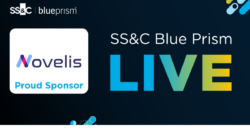L'innovation au service de l'Efficacité Opérationnelle
Notre mission est de révolutionner l'efficacité opérationnelle grâce à l'innovation. En exploitant l'IA, l'automatisation et le Process Intelligence, nous transformons les opérations, stimulons les performances et débloquons la croissance pour les entreprises du monde entier
Nos expertises
Automatisation Intelligente
Intelligence Artificielle et IA Générative
Process Intelligence
Architectures Innovantes
Cybersécurité
Nos Produits

Your Automation Governance Platform
SmartRoby est une solution qui soutient toutes les parties prenantes de la RPA dans leur parcours d'automatisation et rationaliser l'opération de RPA en facilitant l'évaluation de l'impact et la gestion de l'exécution des processus.

Your Purchase & Order Management Platform
Novy POM est une solution d'entreprise qui permet le traitement intelligent et automatique des factures fournisseurs et des bons de commande clients, optimisant leur gestion tout au long de la chaîne complète.
eShadow
Your Advanced Document Anonymization Solution
eShadow est une solution avancée de pseudonymisation et d'anonymisation des documents conçue pour protéger les données sensibles. En utilisant des techniques sophistiquées combinant IA générative et IA symbolique, eShadow permet de sécuriser vos informations confidentielles, tout en préservant leur utilité pour l'analyse et le traitement des données.
eSummarize
Your Precision Summarization Solution
eSummarize est une solution innovante permettant de produire rapidement des résumés précis et concis à partir de textes non structurés et de longs documents. En utilisant des algorithmes d'IA générative, eSummarize extrait de vos documents toutes les informations essentielles pour vous fournir des résumés de qualité en un seul clic.
Nos Evènements







Nos dernières actualités
Certifiés ISO 27001
La certification AFAQ ISO/IEC 27001 démontre que nous avons mis en place un Système de management de la sécurité de l’information (SMSI) efficace construit sur la base de la norme internationale de référence, l’ISO 27001.
